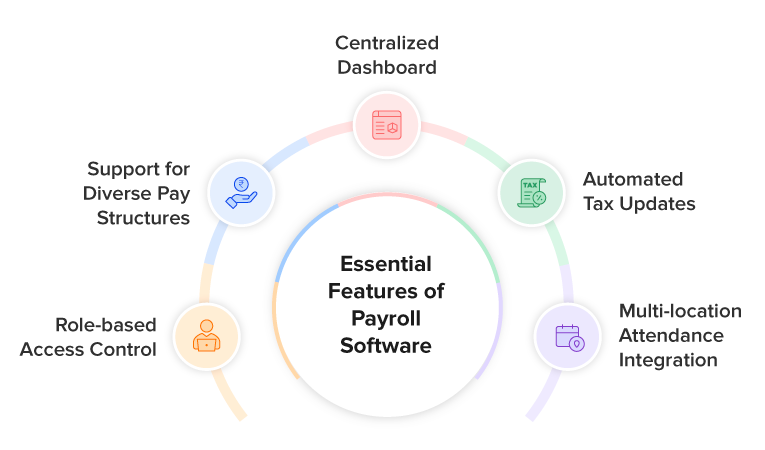How to Handle Payroll for Multi-location Businesses in India

Table of Contents
India has approximately 44 major labor laws. Since many of these laws are state-specific, managing multi-location payroll becomes even more challenging for businesses with offices in multiple locations.
Every branch may follow a different set of rules for minimum wages, tax deductions, or holidays, making payroll slow, confusing, and prone to error. According to a 2023 report, over 65% of Indian businesses with multi-state operations report payroll compliance as their top HR challenge.
In the absence of a centralized payroll system, even minor negligence can lead to legal complications or employee dissatisfaction. Over time, HR teams dedicate more effort to correcting payroll errors than to tasks that are more important.
This guide outlines how businesses in India can manage their multi-branch payroll using a centralized system. It covers key challenges, best practices, and features to look out for in payroll software.

Why is Centralized Payroll Management Important?
For businesses operating across multiple states, payroll management becomes complex due to location-specific rules. A centralized payroll system streamlines operations for businesses managing a global workforce by synchronizing all the data in one place. A few reasons why a centralized payroll system is essential:
Unified Data Management
Instead of storing employee records across spreadsheets or local systems, centralized payroll stores data in one location. When payroll details from different regions where the business operates are stored in a single place, it helps improve accuracy and reduces duplication.
Real-Time Visibility Across Locations
With centralized control, HR teams get real-time updates on payroll status for each location. Salary disbursement, tax deductions, and payroll details are all visible on one dashboard. As a result, it enhances team coordination, addresses regional disparities, and facilitates a faster resolution of payroll issues.
Better Control Over Statutory Compliance
Labor laws and statutory rules differ across different states in India. Introducing a centralized system not only reduces manual intervention but enables companies to enforce the correct rules automatically based on employee location.
Payroll software lowers the chance of fines and penalties. It becomes easier to track changes to regulations, such as updates to minimum wages in India, ensuring payroll processes stay compliant.
Consistency in Payroll Processing
A consistent payroll policy standardizes data entry, calculations, and compliance. This reduces manual work, speeds up the process, and avoids unnecessary delays. Utilizing automation tools and cloud-based payroll ensures that every branch adheres to the same policy.

Challenges in Managing Payroll for Multi-Location Businesses in India
Businesses operating in multiple locations often struggle with coordination, data accuracy, and timely processing of information. Managing payroll across several locations in India is not just a matter of processing salaries. Here are a few challenges organizations encounter:
Varying State-Wise Compliance Laws
Payroll must be adjusted to match each state’s changing labor laws. Failing to do so can result in penalties for businesses. A survey found that companies operating in more than three Indian states spend 30–40% more time on payroll reconciliation than those with a single location. Automating these calculations with reliable cloud payroll software in India ensures these rules are enforced correctly every time.
Different Salary Structures and Allowances
The cost of living and company policies differ in branches in different states. For instance, Bangalore’s average net salary is around ₹1.2 lakhs per month, which is about four times that of Coimbatore. The benefits offered to employees also vary based on these factors. Manually tracking these variations makes payroll processing more complex. An efficient centralized payroll system helps manage such diversity without confusion.
Tax Deductions & Professional Tax Variations
An employee’s location and salary level determine variations to the professional tax rates, income tax deductions, and statutory contributions, such as PF and ESI. Errors in tax calculation can lead to compliance risks. Automated payroll software updates these rules regularly, reducing the need for manual checks.
Time Zone and Holiday Policy Differences
Public holidays differ by state. The same goes for workweek policies or shift schedules, especially in businesses that operate across multiple time zones. Without location-specific holiday calendars and shift settings, payroll errors can become a common problem. Using payroll software with location-based features helps avoid such issues.
Decentralized Employee Data
When employee records are stored at different locations, it becomes tedious to ensure accuracy. Data mismatches, duplicate entries, or missed updates can impact salaries and lead to legal conflicts. A centralized system consolidates all employee data into a single, secure platform, simplifying payroll compliance in India.

Best Practices for Payroll Management Across Multiple Locations
Managing payroll across multiple branches need not be complicated, irrespective of the number of locations in which the business operates.
With the right practices in place, companies can tackle these tasks with ease A few best practices include:
Create a Unified Payroll Policy across All Branches
Start by drafting a single, company-wide payroll policy. This policy should consist of standard procedures for salary processing, deductions, and reimbursements. However, it should also allow for location-specific adjustments to comply with state laws. Referring to a complete payroll guide can support HR teams in implementing these policies effectively.
Conduct Regular Audits and Reconciliations
Payroll data should be reviewed regularly to avoid errors, fraud, or mismatches. Audits help identify any issues early, such as missing deductions or incorrect tax filings. Regular reconciliations also ensure that payroll and attendance data match across all locations.
Automate Payroll Processes Wherever Possible
Manual payroll calculations increase the risk of mistakes, especially when different branches have different rules. By using payroll automation tools, businesses can automate salary calculations, tax deductions, and statutory filings. This saves time and ensures better accuracy.
Using cloud-based payroll software with mobile access helps remote employees access their payslips, tax forms, and leave balances from anywhere. Cloud platforms provide enhanced security, scalability, and speed, all of which are vital for modern business survival.
Train HR Staff on State-Specific Regulations.
To address the specific needs of each work location, HR teams must be trained in these state-specific policies. Hands-on training minimizes error risk and improves overall payroll compliance. Clear communication between HR teams bridges gaps, making business operations more efficient and smoother.
Key Features to Look for in Payroll Software for Multi-Location Businesses
Choosing the right payroll software is crucial when managing employees across several branches. Understanding the payroll software benefits can help companies in several ways:
Here are some essential features to look for in multi-location business payroll software:

Centralized Dashboard with Location-Wise Control
A centralized dashboard gives HR teams complete visibility of payroll activities across all branches. It allows teams to monitor data, track changes, and process salaries from a single interface. This level of control streamlines complex tasks for HR teams, enabling businesses to handle multi-location needs efficiently.
Automated Tax and Compliance Updates
Laws related to PF, ESI, professional tax, and LWF often vary from state to state. An effective payroll software should have features that automatically reflect these updates. This feature helps maintain payroll compliance in India without depending on manual updates or external consultants.
Multi-Location Attendance and Leave Integration
Payroll accuracy depends on correct attendance and leave data. When software integrates with location-based attendance systems, it reduces the need for data imports and manual checks. This also ensures that minimum wages and overtime pay are calculated in accordance with regional labor laws.
Role-Based Access and User Permissions
Payroll software should enable businesses to establish distinct access levels for various users based on their respective authorities. For example, a branch HR manager may only need access to their location’s data, while the head office may require complete access to all data. Role-based controls ensure data security and privacy across teams and organizations.
Support for Diverse Pay Structures and CTC Formats
Different locations follow different ctc structure, salary components, allowances, or reimbursement methodologies. Payroll software should support custom settings to handle various pay structures. This feature is particularly significant for companies that employ both full-time and contract workers across multiple branches.

In Final Words
Managing Payroll for multi-location businesses in India involves more than just timely salary payments; it also requires effective management of employee records and accurate reporting. The diversity in laws across each state makes this job intimidating. It involves challenges that can quickly become overwhelming without the right system in place.
For growing businesses, investing in a solution with the right payroll software features in India is essential to keep the business running smoothly and efficiently. To determine the benefits of payroll software, request a demo. It supports scalability, improves decision-making, and builds employee trust through timely and error-free payments.
factoHR is a trusted payroll partner for many leading businesses across India. With powerful features like centralized dashboards, automated compliance updates, and location-wise configurations, factoHR helps HR teams manage multi-location payroll effortlessly.
Grow your business with factoHR today
Focus on the significant decision-making tasks, transfer all your common repetitive HR tasks to factoHR and see the things falling into their place.

© 2026 Copyright factoHR


